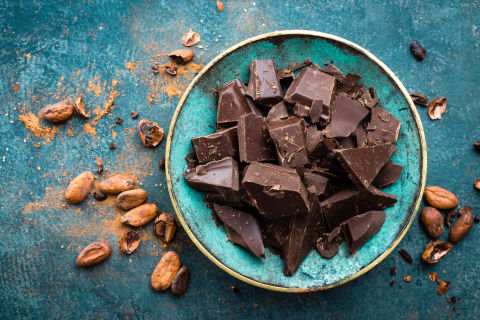Advertisement
10 Habits That Will Help You Become The Healthiest, Slimmest Version Of You


Looking to get in the best shape of your life this year? Here are 10 foods and habits to help you get there.
1. Eat protein.
It's essential to eat protein because your body uses it for muscle and tissue repair, and it breaks down into the amino acids used to synthesize feel-good neurotransmitters in your brain responsible for good mood, sex drive, appetite control, sleep, and regulating cravings. For example, tryptophan in animal proteins and select plant foods are a precursor to serotonin.
Lack of quality protein is one of the most common factors I see with clients having difficulty with weight loss. They're either eating too many grain-based foods for their physiology (and the lectins present in grains can cause inflammation1 that prevents weight loss), or they’re just not eating enough protein with meals, so they’re not satisfied.
Examples of quality protein are: grass fed beef and lamb; organic poultry; cage free eggs, preferably from a local farm; and wild fish. For vegetarians, legumes are not a complete source of protein, meaning they do not provide all essential amino acids, so combine with quinoa , brown rice, or another nourishing whole grain.
2. Eat good fats.
If you are afraid of fats, it’s important to know that eating the right kind of fats is not unhealthy. Good fats stoke your metabolism and encourage weight loss. Your brain is mostly fat, and your cell membranes need fat to stay permeable, allowing nutrients to enter. Good fats are coconut oil, olive oil, grass fed butter, and avocado. Avoid refined vegetable oils and hydrogenated fats.
3. Get some cinnamon.
This amazing and antioxidant-rich spice has a blood sugar and insulin balancing effect2 for stable energy and reduced hunger, and it may lower cholesterol and reduce inflammation. Add 1 teaspoon to your morning smoothie.
4. Drink green tea.
It's thermogenic, contains antioxidants, and it tastes good, Drink it in the mornings instead of sugar-filled coffee drinks, which can leave you with a crash. Green tea gives you a pleasant boost and may reduce cravings. Have a cup after lunch to ward off the dreaded 3 p.m. slump.
5. Drink more filtered water.
Hydration is important for facilitating countless body functions, including the body’s natural detoxification process via the liver and kidneys. We sometimes confuse thirst for hunger, so if you’re feeling hungry quickly after eating a meal, drink a glass of water and then see how you feel twenty or thirty minutes later. Add cucumber slices and lemon wedges to spice it up.
6. Do some burst training and yoga.
Instead of pounding the pavement for hours (I can’t tell you how many marathon-training clients have come to me befuddled by the fact that they’re actually gaining weight), try medium to high intensity interval training.
How it works: Walk for 1 minute; sprint for 30 seconds. Repeat this circuit for 15 to 20 minutes at whatever intensity is right for you. It’s a much more effective way to burn fat than running for hours. Alternate with yoga to elongate muscles and center yourself, and you're golden.
7. Sleep 7 to 9 hours every night.
Seven to nine hours of sleep is essential to maintain healthy body composition. Your body perceives lack of sleep as a stress, which raises cortisol, increasing sugar cravings and fat storage. Ever notice how you crave sugar and carbs the day after you haven’t slept well? Unplug from your devices and try to get to bed at a reasonable hour.
8. Enjoy some dark chocolate.
The antioxidants in dark chocolate have been linked to positive health benefits, like insulin resistance and protection against metabolic diseases.3 It has also been known to reduce inflammation4 and increase the level of sirtuins5—a type of protein found in the body that regulate metabolism—which is why dark chocolate is allowed on the Sirtfood diet. Aside from that, it tastes good! Choose 70% or higher dark chocolate, which has far less sugar than milk chocolate, and often doesn't contain dairy.
9. Eat 35 to 50 grams of fiber daily.
Fiber binds to cholesterol and escorts it out of the body. It also regulates bowel movements and decreases constipation, which improves digestion. I’ll spare you a lecture on insoluble and soluble fiber, but you need a certain amount of both because soluble fiber (fruit, legumes) makes you feel full and stabilizes blood sugar, and insoluble fiber (grains, leafy greens) feeds the good bacteria in your gut and fosters regularity.
10. Eat probiotic foods.
Studies show that probiotics, the beneficial bacteria in your gut, play a role in weight loss and help prevent weight gain. Probiotics are essential for synthesizing certain vitamins, good digestive function, and immune health. Get them from raw kraut, beet kvass or kombucha, or kefir if you tolerate dairy.
